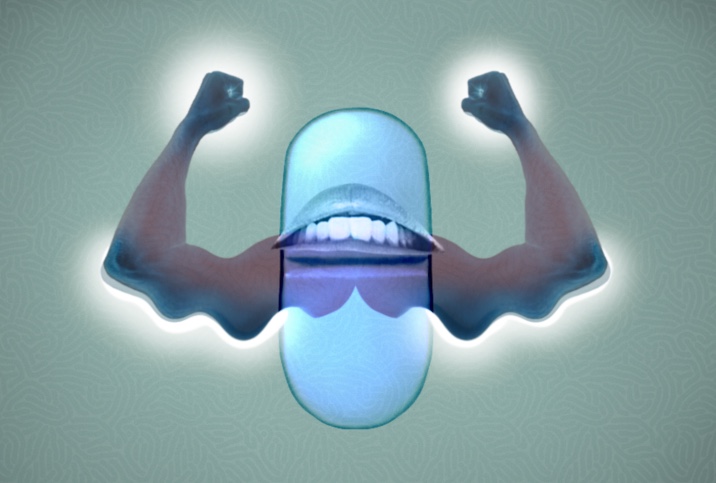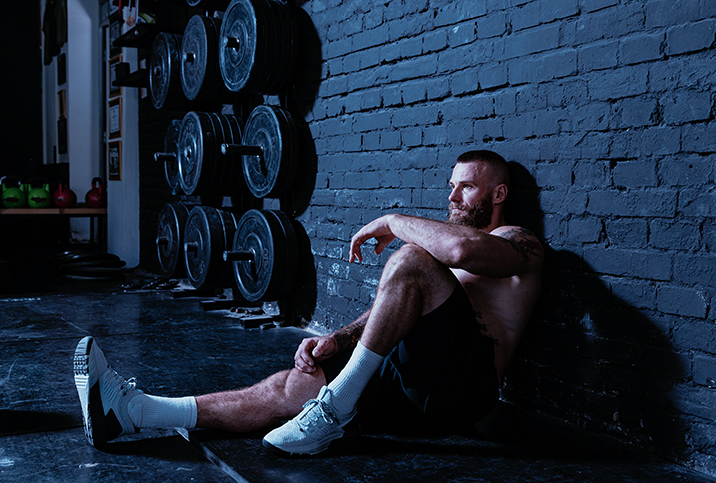How Diet and Exercise Can Optimize Testosterone—for Everyone

In this era of ubiquitous ads for standalone men's health clinics and testosterone-boosting products, some people seem to think of testosterone as just a little something extra: a boost that guys might want to add to their daily supplement cocktail.
There's so much more to testosterone. It's definitely not a daily B-complex vitamin you thoughtlessly gulp down with your morning coffee. Poorly calibrated testosterone levels can have effects—both subtle and not so subtle—on all sorts of bodily functions.
It's a two-way street: The lifestyle choices we make have a tremendous impact on our hormones. The ways we choose to eat, exercise, sleep and celebrate can all exert a great deal of control over our natural testosterone production.
Find out how diet and nutrition affect testosterone production, as well as how exercise can help your body optimize testosterone levels. Learn how testosterone isn't just for guys and estrogen isn't just for women.
Testosterone and nutrition
It's true that testosterone gives males many of their typical characteristics. The tsunami of testosterone that washes through boys during adolescence results in adults with deeper voices, body and facial hair, larger muscles and a healthy, functioning reproductive system.
Testosterone is also at play for assigned female at birth (AFAB) people who transition to male later in life. Transgender men are often given testosterone injections and other hormone therapies to help them feel less gender dysphoric in their bodies and give them more typically male characteristics.
Know that testosterone is a naturally produced hormone that all human bodies make throughout their lives. As such, it's very much affected by the type of fuel you feed the machine: garbage in, garbage out, as they say.
"Eating behaviors that often result in weight gain, like eating processed foods and large-portion sizes, may also lead to the development of chronic diseases like heart disease and insulin resistance," said Amy Pearlman, M.D., a men's health specialist and co-founder of Prime Institute in Fort Lauderdale, Florida. "And chronic illness is also associated with low testosterone levels."
Conversely, it's fairly well known that a diet rich in whole foods, low in processed foods and sugars, and high in fiber has an impact on so many aspects of our health. It's no surprise that one of those areas is testosterone production.
However, it's buyer beware if you put too much stock in articles that make claims such as, "These five superfoods will instantly boost your testosterone!"
The science simply isn't there yet to strongly assert that specific foods directly affect testosterone levels, according to Pearlman.
"The impact of nutrition on testosterone hasn't been teased out to provide concrete recommendations," she said. "The impact of specific macro/micronutrient diets and types of calories on male sex hormones have been studied. But some studies show changes in male sex hormones with various nutritional intake, whereas others show no association. The impact of calorie restriction is also unclear."
There is, however, one major exception, and it means bad news for all you soda lovers out there.
"Data suggest that drinking sugar-sweetened beverages with high-glycemic loads results in an immediate decrease in total testosterone and free testosterone," Pearlman said.
A study of a group of men with various degrees of glucose tolerance, both healthy and unhealthy, showed a 25 percent drop in testosterone levels that lasted for at least two hours after they ingested a 75-gram glucose tolerance test—about two Coke's worth of sugar. Around 15 percent of the subjects saw their post-glucose testosterone levels drop to the point of being hypogonadal, or meeting the clinical definition of low testosterone.
Exercise
Apart from diet—especially giving up soda—the other good news about our ability to control our own testosterone levels has to do with exercise and the scope of its benefits. Consider the major ways we can naturally boost testosterone production:
- Eat a healthy diet
- Cut processed sugars
- Get good sleep
- Cut down on alcohol
- Lose excess weight
- Exercise
Of these, exercise might be the most exciting, simply because it can enhance so many of the other strategies. For instance, regular exercise helps with weight control and regulating sleep. You could even say it discourages drinking too much, because who wants to work out with a hangover?
"We know that excess body weight—either overweight or obese—is very common and can also result in low testosterone levels," Pearlman said.
The great news is that the research suggests for men with obesity, adding a regular exercise program to their dietary weight-loss regimen consistently shows improvement in testosterone production.
One yearlong study from 2008 recruited a group of men who hadn't previously engaged in regular exercise. Researchers found their levels of the androgen dihydrotestosterone (DHT)—a crucial metabolite of testosterone that's three to six times stronger than testosterone itself—jumped by nearly 15 percent.
Another study, this one from 2012, suggested that men who exercised regularly not only had healthier hormone numbers than sedentary men, but also had healthier semen.
In other good news for men who are overweight or obese, a 2016 study showed that exercise did more to increase testosterone levels than losing weight.
Sex hormones, not gender hormones
Finally, it's high time to debunk the mythos around testosterone being "the dude's hormone" and estrogen being "the hormone for the ladies."
As noted above, all humans, including cisgender and transgender people all along the spectrum, naturally produce some amount of testosterone and estrogen. It just happens that males organically produce more testosterone, and females produce more estrogen.
However, for guys who are considering testosterone replacement therapy (TRT), understanding the delicate balance of these paired hormones and how they work is crucial.
Too much testosterone can kick your natural estrogen production into high gear. That's part of the reason it's inadvisable to attempt do-it-yourself TRT or to go to a single-solution clinic that doesn't do the proper prescreening and/or follow-up bloodwork once it has started you on TRT.
That can cause significant problems.
"Testosterone gets converted to estrogen via an enzyme called aromatase, and it's present in a variety of cells in the body and it's also present in fat cells," Pearlman said. "Some people will convert a lot of their testosterone to estrogen. And when estrogen is too high, it can cause breast tenderness, breast swelling and retaining fluid, but we can put people on medication to block that conversion."
Balance is the key. Don't be fooled into thinking TRT is something you can take up casually.
It's true the human body is a remarkable machine, and we know a lot about how to gently and effectively nudge its inner workings in one direction or another, but clumsily, thoughtlessly messing with your hormones can cause serious trouble.
Before you decide low-T is the reason for your symptoms, consult your physician. Don't have a doctor you see regularly? You should. Fortunately, telehealth makes it easy to connect with a professional who can answer your questions and evaluate your situation. Many physicians offer same-day video visits. Giddy Telehealth is an easy-to-use online portal that provides access to hundreds of healthcare professionals whose expertise covers the full scope of medical care.


















